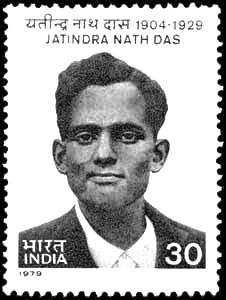 These days when fasting has become a trend for most politicians, does anyone remember Jatin Das? Today is his birth anniversary. He was a true comrade of HSRA, the league of Bhagat Singh, Sukhdev, Rajguru, Ram Prasad Bismil, Ashfaqullah Khan, Roshan Singh and Chandrashekar Azad. Jatin Das fasted for 63 days in Lahore jail, and attained martyrdom, with is fast unbroken, his spirits unconquered! Jatin da, We salute you!
These days when fasting has become a trend for most politicians, does anyone remember Jatin Das? Today is his birth anniversary. He was a true comrade of HSRA, the league of Bhagat Singh, Sukhdev, Rajguru, Ram Prasad Bismil, Ashfaqullah Khan, Roshan Singh and Chandrashekar Azad. Jatin Das fasted for 63 days in Lahore jail, and attained martyrdom, with is fast unbroken, his spirits unconquered! Jatin da, We salute you!
Within days of Bhagat Singh’s arrest, police unearthed a house in Lahore used as a bomb making workshop. It followed a string of arrests like Sukhdev, Hansraj, Jaigopal, Shiv Verma, Rajguru, Vijay Singh and finally Jatin Das from Calcutta. This sensational event became popular as the Lahore Conspiracy Case that ultimately led to the martyrdom of Bhagat Singh-Rajguru-Sukhdev on March 23, 1931.
While in the Lahore jail, Jatin Das started a hunger strike along with other revolutionaries, demanding equality for Indian prisoners and under trials. The conditions of Indian inhabitants of the jails was deplorable-the jail uniforms that they were provided with were not washed since several days, the kitchen area and the food was covered with rats and cockroaches, they were not provided with any reading material-no newspapers, no paper, while the condition of the English prisoners in the same jail was strikingly different.
The jail authority took many measures to forcibly feed Jatin Das and the other freedom fighters, beat them and did not even provide them with drinking water. However, Jatin did not eat. The jail committee even recommended his unconditional release. Jatin died on September 13, 1929, his hunger strike unbroken for 63 days.
After his supreme sacrifice, the whole country gave him an ovation which few men in our recent history have received. As his body was carried from Lahore to Kolkata by train, thousands of people rushed to every station to pay their homage to the martyr. A two-mile long procession in Kolkata carried his dead body to the cremation ground. In words of Subhash Chandra Bose-
Jatin Das was twenty-five at the time of his death. While a student he had joined the Non-Cooperation Movement in 1921 and had spent several years in prison. At the time of the Calcutta Congress in 1928 and after, he had taken a leading part in organizing and training volunteers. Whether at Cellular Jail (where Savarkar stayed) or Mandalay (where Bose was incarcerated) British jailers treated extremist political prisoners as harshly as any murderer or robber. In June, arrestees of Lahore Conspiracy Case decided to go on hunger strike to protest against atrocities. The hunger strike aroused intense agitation in the country, but little softened the heart of the British authorities. As the days rolled by, one by one the hunger-strikers dropped off, but young Jatin was invincible. He never hesitated, never faltered for one small second but marched straight on towards death and freedom. Every heart in the country melted but the heart of the bureaucracy did not. So Jatin died on September 13th. But he died a martyr’s death.
Let's not forget the martyrs! They gave us this land we so dearly call ours! Let's live up to the dreams they weaved when giving away their lives. Let's not forget the fact that- They died for us!
